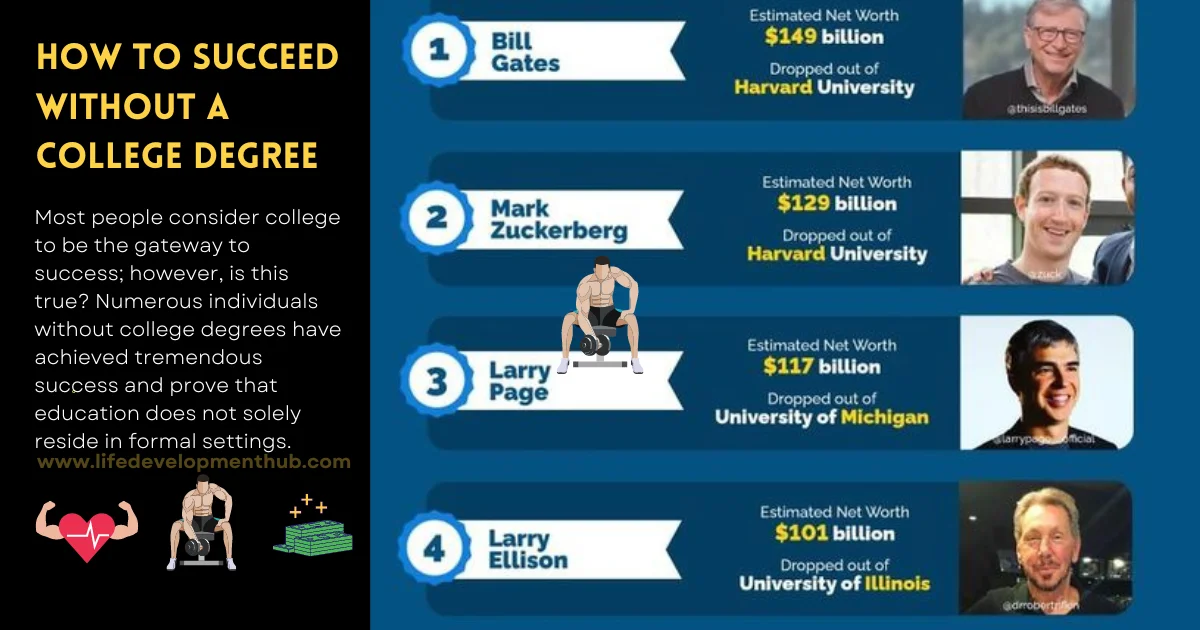Most people consider college to be the gateway to success; however, is this true? Numerous individuals without college degrees have achieved tremendous success and prove that education does not solely reside in formal settings. This article looks at nine notable dropouts who achieved greatness despite all odds by making history themselves. successful people who didn’t go to college
Learn how to succeed without a college degree from the stories of nine famous dropouts who achieved remarkable success in their fields.
Bill Gates
is one of the richest and most powerful individuals on Earth today, having founded one of the biggest software corporations known as Microsoft in 1975 along with fellow founder Paul Allen. Since then, his net worth has skyrocketed – exceeding $100 billion as one of today’s richest individuals
1.
Mark Zuckerberg
is the creator and CEO of Facebook, the world’s most popular social networking service. To expand his business further, he left Harvard in 2005; having established it while still attending. Facebook currently boasts approximately 2.8 billion monthly active users globally and is valued at more than $900 billion on the market2. In addition, Zuckerberg pledged 99% of his shares to other charitable organizations3.
Steve Jobs
was an inspirational leader and co-founder of Apple, an iconic business that revolutionized mobile devices, music, and personal computing. After only one semester at Reed College he dropped out, attending classes that peaked his interest nonetheless. Co-founding Apple with Steve Wozniak in 1976 led to Jobs being fired, but later rejoining in 1997; famous products like Macintosh computers, iPods, iPhones, and iPads all bear his mark; although his pancreatic cancer battle ended prematurely in 2011 his legacy lives on as one of history’s great innovators.
Oprah Winfrey
is an influential media mogul known for hosting talk shows, producing, acting and being philanthropist. Her most acclaimed role was hosting The Oprah Winfrey Show for 25 years – which reached millions around the world during that period – before she made the transition into broadcasting full time and left Tennessee State University (from which she earned an honorary degree later) to pursue broadcasting full time in 1976; later that same year Tennessee State awarded her with an honorary degree as well. She founded OWN (Oprah Winfrey Network), O,
The Oprah Magazine and Harpo Productions before being considered one of the wealthiest and most influential women worldwide! Her net worth exceeds $2.6 billion making her one of the wealthiest and most influential women worldwide!
Richard Branson
is the founder and chairman of Virgin Group, an international conglomerate comprising over 400 businesses that span various fields such as space exploration, telecom, music production, aviation and more. At 16 he launched Student magazine as his inaugural venture;
since then he has started many more including Virgin Galactic, Atlantic Mobile Networks (Vinson Mobile), Virgin Records as well as his authorship of books like Free as an Air Pilot (freeasairpilot.net) as well as being known for humanitarian work he undertakes – his net wealth now stands at $5.9 Billion!
Ellen DeGeneres
is an award-winning comedian, talk show host, producer, actress and writer with multiple talents and skillsets. Most renowned is her Emmy-award winning talk show “The Ellen DeGeneres Show”, airing since 2003 and featuring musical guests, celebrities and motivational tales – her most celebrated work to date. DeGeneres left University of New Orleans after just one semester to pursue comedy; becoming the first openly gay host of a national television programme; also supporting animal rights causes as well as LGBTQ+ rights; ultimately surpassing $370 Million.
Sachin Tendulkar
is one of the greatest batsmen of all time and an iconic cricket player. From 1989-2013 he served on India’s national team and holds records for most runs and hundreds in both One Day International and Test cricket formats. To focus on his cricket career he left school after the tenth grade;
at sixteen he made his debut for his nation; now, in addition to serving on Rajya Sabha (upper house of Indian parliament) he holds India’s highest civilian honour – Bharat Ratna) while his net worth exceeds $150 million!
Ritesh Agarwal
founded and is leading OYO Hotels – an exponentially expanding hotel chain around the world – after leaving college early and touring India to gain knowledge in this sector, at 19 he launched OYO at over 43,000 hotels with 1.2 million rooms globally across 80 countries spanning his network.
Agarwal now ranks amongst the youngest billionaires.
Mary Kom
is an unparalleled champion, becoming the only female boxer ever to capture six world championships and securing an Olympic medal from India in boxing. After leaving school after eighth grade to pursue boxing full time, she encountered numerous hardships along her journey – which inspired millions of women and girls around the globe while serving as mother to four, member of Rajya Sabha, recipient of Padma Shri and Padma Vibhushan awards, member of Rajya Sabha as well as being worth over five million dollars!
Conclusion:
Non-college graduates have many successful examples; here is just a sampling. Their stories show us that success doesn’t require attending college and that achievement doesn’t equate with diplomas and degrees – rather your drive, vision, diligence and global influence are what define success – don’t listen to anyone suggesting a college degree is essential; follow your dreams with faith in yourself and you can achieve great things.
A FAQ (Frequently Asked Questions) might also help.
Are there any advantages and disadvantages of attending college? A: Attending college has many advantages, such as:
* Gaining more knowledge and expertise in your chosen field
* Improving analytical and problem-solving skills
* Strengthening interpersonal and communication skills
* Building relationships with peers, instructors and mentors
* Opening doors to more opportunities for career advancement and higher income
* Discovering interests and passions
Q: What are some downsides associated with going to college?
A: Attending college has its share of disadvantages. These may include costly tuition, fees, books and living expenses; mounting student debt that may take years to repay;
entering an unpredictable and competitive job market upon graduation; losing out on valuable experience that could be used elsewhere;
feeling stressed out from their academic workload whilst feeling pressured from its demands, etc.
successful people who didn’t go to college successful people who didn’t go to college
Q: Without attending college how can I succeed?
College degree isn’t necessary for success; here are some general guidelines:
* Establish your objectives, passions, and strengths. To find guidance and support, look for mentors, coaches, role models or online courses as well as books, podcasts, blogs or any other forms of study material that might help.
* Build your portfolio, resume and personal brand; * Network with people who can help find opportunities and referrals; * Gain real-world experience through internships, apprenticeships, freelancing or entrepreneurship; * Continue growing, learning and adapting to evolving trends and demands. successful people who didn’t go to college

